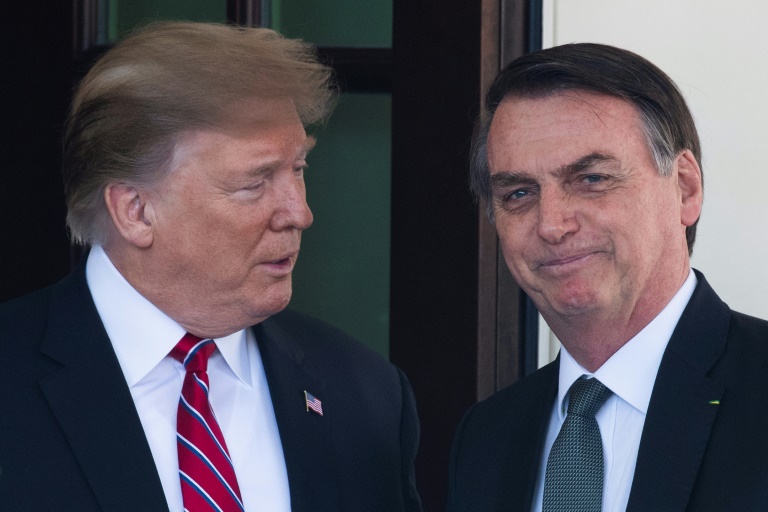President Donald Trump hosted Brazilian President Jair Bolsonaro, the so-called “Trump of the Tropics,” on Tuesday at the White House to cement a new alliance between their right-wing governments.
Referencing the two presidents’ many similarities, Trump’s national security advisor John Bolton joked Trump should be dubbed “the Bolsonaro of North America.”
Bolton’s willingness to compare Trump to the Brazilian president in that way was startling to critics, who have pointed out Bolsonaro’s long-standing reputation for anti-democratic, racist, misogynistic and anti-gay views.
Bolsonaro has spoken nostalgically about Brazil’s former military dictatorship, saying plainly in 1999, “I am in favor of a dictatorship.”
He’s also spoken fondly of torture and has praised the infamous paramilitary gangs believed to be responsible for the high-profile 2018 assassination of Rio de Janeiro activist and councilwoman Marielle Franco, as well thousands of other extrajudicial killings.
Before being elected, Bolsonaro was the only presidential candidate who did not publicly condemn Franco’s murder, and in the weeks leading up to his trip to Washington, mounting evidence has emerged suggesting his family has personal and professional links to members of paramilitary groups, including the two suspects arrested in connection to the assassination.
Bolsonaro was not asked about his family’s ties to the groups on Tuesday, but told Fox News on Monday they a merely a “coincidence.”
State Department spokesperson Robert Palladino told The Globe Post last week that he was unaware of the reports.
Social Conservatism
Bolsonaro’s visit to Washington marked his first bilateral state trip since being inaugurated in January. On Tuesday, the two president’s heaped praise on one another, describing shared views on social and economic issues.
“Brazil and the United States stand side by side in their efforts to ensure liberties in respect to traditional family lifestyles, in respect to God our creator, against the gender ideology or the politically correct attitudes and against fake news,” Bolsonaro said at a joint press conference, referencing the two administration’s embrace of social conservatism and disdain for the press.
Bolsonaro has said that he would rather one of his sons die in a car accident than be gay, and the country’s only openly gay member of Congress resigned and fled the country after his election victory, apparently fearing for his life.
Trump said he has a “fantastic working relationship” with his Brazilian counterpart, adding they share “many views that are similar.”
Privatization
The two leaders also touted their shared interest in opening up Brazil’s economy and resources to private American investors.
As a candidate, Bolsonaro vowed to roll back environmental protections and open the Amazon rainforest, often dubbed “the lungs of the Earth,” to agribusiness and mining.
“The President’s vision for freeing the private sector and opening the economy is the right way to facilitate economic growth,” Trump said. “And our great companies are ready to go.”
Brazil also has expansive offshore oil reserves, and Bolsonaro alluded to the possibility of allowing American investment in future extraction.
“We will be re-launching an energy forum [with the U.S.] with an emphasis on oil, gas, and other resources,” he said.
Such a move would be a radical departure from traditional Brazilian policy under its former leftist regimes, which nationalized the country’s oil reserves and formed the public company Petrobras.
Ousting Maduro
Condemning such socialist programs, Trump and Bolsonaro also discussed their mutual desire to oust Venezuelan President Nicolas Maduro, whose government remains in power despite U.S.-led efforts to bring National Assembly leader and self-declared interim president Juan Guaido into power.
Brazil was one of the first countries to join the U.S. in recognizing Guaido, and Bolsonaro on Tuesday vowed to support the U.S. in efforts to “put an end to [the Maduro regime], which is pervasive to the whole wide world.”
Trump vowed that U.S. sanctions, which are already having a crippling effect on Venezuela’s already hurting economy – could get “a lot tougher,” and declared that the “twilight hour of socialism has arrived in our hemisphere.” He also called out Cuba and Nicaragua, which are allies of Venezuela.
But with no imminent end to Maduro’s regime in sight, Trump reaffirmed that “all options on are on the table” – an apparent threat that the U.S. could intervene militarily.
Bolsonaro said he had spoken to Trump about allowing the U.S. military to position itself in Brazil near the Venezuelan border, but would not say whether or not he would support military action.
Vowing to enhance the two country’s military and intelligence partnerships, Bolsonaro visited the headquarters of the Central Intelligence Agency on Monday – a rare move for foreign leaders that took many by surprise.
The president was joined by Justice Minister Sergio Moro – who before being appointed to his new position was the federal judge who prosecuted Bolsonaro’s main political opponent, former leftist president Luiz Inácio Lula da Silva.
More on the Subject
The newest Brazilian President, Jair Bolsonaro, took office on January first with harsh and divisive messages and promises to the Brazilian population.
His inauguration speech, which was broadcasted on national television and watched by several foreign heads of states, set the tone for the next four years.
Policies that would affect the LGBT community and other minority groups have left activists hoping that the president will fail to deliver on his promises, while Bolsonaro’s supporters are cheering on their new leader.


